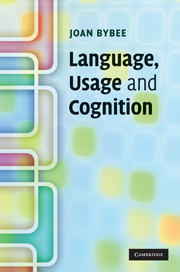Book contents
- Frontmatter
- Contents
- List of figures
- List of tables
- Acknowledgements
- 1 A usage-based perspective on language
- 2 Rich memory for language: exemplar representation
- 3 Chunking and degrees of autonomy
- 4 Analogy and similarity
- 5 Categorization and the distribution of constructions in corpora
- 6 Where do constructions come from? Synchrony and diachrony in a usage-based theory
- 7 Reanalysis or the gradual creation of new categories? The English Auxiliary
- 8 Gradient constituency and gradual reanalysis
- 9 Conventionalization and the local vs. the general: Modern English can
- 10 Exemplars and grammatical meaning: the specific and the general
- 11 Language as a complex adaptive system: the interaction of cognition, culture and use
- Notes
- Bibliography
- Index
2 - Rich memory for language: exemplar representation
Published online by Cambridge University Press: 05 June 2012
- Frontmatter
- Contents
- List of figures
- List of tables
- Acknowledgements
- 1 A usage-based perspective on language
- 2 Rich memory for language: exemplar representation
- 3 Chunking and degrees of autonomy
- 4 Analogy and similarity
- 5 Categorization and the distribution of constructions in corpora
- 6 Where do constructions come from? Synchrony and diachrony in a usage-based theory
- 7 Reanalysis or the gradual creation of new categories? The English Auxiliary
- 8 Gradient constituency and gradual reanalysis
- 9 Conventionalization and the local vs. the general: Modern English can
- 10 Exemplars and grammatical meaning: the specific and the general
- 11 Language as a complex adaptive system: the interaction of cognition, culture and use
- Notes
- Bibliography
- Index
Summary
Introduction
Central to the usage-based position is the hypothesis that instances of use impact the cognitive representation of language. Throughout this book arguments for an exemplar representation of language will be given, including the arguments that exemplar representations keep track of usage, allow for the representation of gradience in structures, and allow for gradual change. In demonstrating the properties of exemplar models, the present chapter will emphasize one aspect of exemplar representation – the fact that exemplars are considered to register details about linguistic experience. Exemplar representations are rich memory representations; they contain, at least potentially, all the information a language user can perceive in a linguistic experience. This information consists of phonetic detail, including redundant and variable features, the lexical items and constructions used, the meaning, inferences made from this meaning and from the context, and properties of the social, physical and linguistic context.
We see in this chapter that recent research in phonetic categorization, voice recognition, sociophonetics, lexical diffusion of sound change, grammaticalization, and verbatim recall all point to the retention of considerable linguistic detail in cognitive representations. The interesting questions to be addressed here and in the rest of this book are how the brain deals with this detail, how it handles similarities and differences among tokens of input and registered exemplars and how repetition of tokens affects representations.
- Type
- Chapter
- Information
- Language, Usage and Cognition , pp. 14 - 32Publisher: Cambridge University PressPrint publication year: 2010



